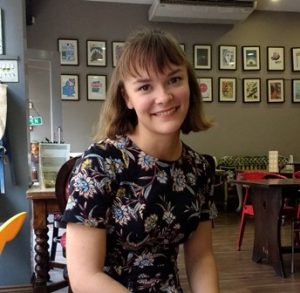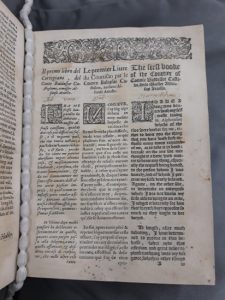
This summer I’ve researched ‘French Verse in Renaissance Britain’ through the College of Arts and Law Undergraduate Research Scholarship Scheme, supporting Dr Peter Auger from the Department of English Literature. The project provided me with a brilliant opportunity to bring both the English Literature and French aspects of my Joint Honours degree together to produce original research. The aims of the project were to investigate what kinds of French books were being translated, read, and bought in Renaissance Britain, with an emphasis on where and how French verse appeared within texts between 1557 and 1641.
Before starting my scholarship, I had some experience of Renaissance literature and I have always had a strong interest in Shakespeare and literary translation. At the beginning, there was a healthy mixture of excitement and apprehension at the idea of my research leading to new findings, coupled with a kind of independent working which is completely different to my previous university studies. I really appreciated having an introductory session with Peter before starting my project, as we were able to discuss my research and plan how we would work collaboratively.
My main task for the project was to create an Excel database bringing together information from various pre-existing data sets. One challenge I found at the beginning was how rusty my ICT skills had become since GCSE, although I was able to work with Peter to find a good system which I refined further as I continued working.
Early on I found myself gravitating towards certain areas of interest, namely works by women and language-learning books. Despite being a minority, women were responsible for producing some of the most important and popular texts translated in Renaissance Britain. Mary Sidney Herbert, for example, translated The Tragedie of Antonie (1595) by Robert Garnier, which has been regarded as a potential source for William Shakespeare’s Antony and Cleopatra. Translating as a young female servant, Judith Man’s preface to An epitome of the history of faire Argenis and Polyarchus (1640), by John Barclay, provides a unique insight into her reflections and anxieties over her work.
As a modern languages student, I was immediately drawn to language-learning books from the period. Parallel texts feature languages in adjacent columns, so the reader can pick up multiple languages easily while also enjoying a book in their mother tongue. One example of this is the Histoire de Aurelio et Isabelle (1556), originally by Juan de Flores. This text features Italian, French, Spanish, and English in parallel columns on the same page. A language learner could progress from this onto a more advanced textbook such as A French grammar and syntaxe (1634), demonstrating a higher level of language.

The UGRS has completely changed my views on undertaking research and over the course of the project I became excited about the thought that my findings will develop into something as part of the academic community in the future. I thoroughly enjoyed the independent type of researching as part of the UGRS Scheme and it has confirmed to me that I want to undertake post-graduate study. My project has given me a great insight into translated literature in Renaissance Britain and I now have lots of questions and thoughts which I would love to explore in the future.
Lucy Painter, BA Modern Languages and English
